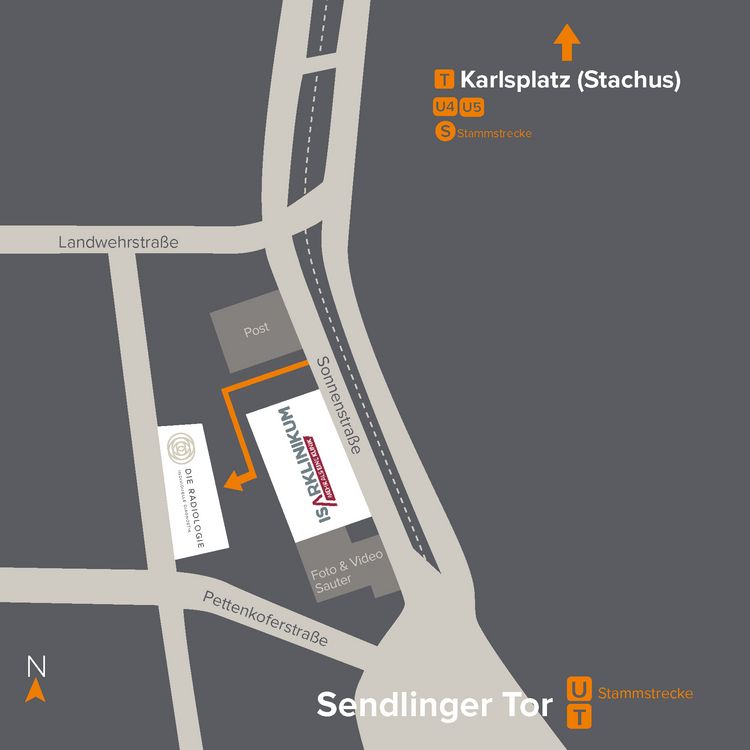This is how you can reach us directly:
+49 . 89 . 550 596 720
What is a FDG-PET/CT examination?
18FDG describes a weakly radiolabeled glucose molecule (18Fluoro-deoxyglucose), of which radiation can be detected and made visible by means of a PET camera.
After an intravenous injection of a small amount, metabolic processes in the body can be visualized. The radioactive labelled sugar accumulates in the tissue and provides information about metabolic activities. This is particularly important in the diagnosis of tumor diseases, since most tumor cells have a higher metabolism than healthy cells. In combination with computed tomography, PET/CT can combine the high resolution of CT to assess morphological criteria (e.g. size and appearance of a tumor) with metabolic activity. The combination of the two methods guarantees optimal imaging, which in many cases provides more information and can make a significant contribution to optimizing tumor treatment.
In addition exact and accurate diagnoses can also be made for numerous other benign diseases by assessing metabolic activity using PET/CT.
FDG-PET/CT is used for numerous tumor diseases and benign diseases.
If there are any uncertainties or questions regarding the indication for performing the FDG-PET/CT, you can contact us at any time.
T +49 . 89 . 550 596 720
E info{at}die-nuklearmedizin.de
-
What should be brought to the examination?
-
Current kidney test results (creatinine) and thyroid laboratory parameters (TSH).
-
Copy of results of preliminary examinations and treatments (e.g. reports of previous operations, previous therapies, etc.), if available.
-
Preliminary images (e.g. CT, MRI or PET/CT preliminary examinations) on CD/DVD or access to corresponding online portals, if available.
-
-
Patients must avoid food intake 4-6 hours. Unsweetened mineral water or unsweetened tea is allowed.
-
Patients with diabetes mellitus, insulin dose should be adapted to the restricted food intake (please contact your treating doctors if necessary).
-
Patients who are taking metformin (diabetes) and have impaired kidney function, should pause metformin on the day of the examination.
-
Patients with severe claustrophobia, please inform us in advance of the examination. If necessary, the examination can be carried out while taking sedatives.
First of all, there is a medical consultation about the examination. Then the weakly radioactively labeled drug (PSMA ligand) will be administered intravenously. If necessary, you will be given a diuretic medication for faster excretion of the substance. This is followed by a waiting period during which the radioactively labelled substance can spread throughout your body.
Now the image-recordings are made (approx. 20 to 30 minutes waiting time).
After completion of the examination, the results will be discussed with you.
Due to the use of a very small amount of radiopharmaceutical, for this examination no pharmacological side effects have been known.
In rare cases, allergic reactions to the X-ray contrast agent may occur during the PET/CT examination. If a contrast agent allergy is known, we ask for early notification before the start of the examination (please bring an allergy passport if available). If necessary, the examination can also be carried out without X-ray contrast agent or after prior premedication (observe unfitness to drive).
In addition, the PET/CT examination is connected to radiation exposure. Thus, the examination is carried out only according to strict indications. If you have any further questions, please do not hesitate to contact our medical colleagues.
-
Private health insurance companies usually cover the costs of the PSMA-PET/CT examination.
-
In case of patients with public health insurance, costs for FDG-Pet/CT are only covered for certain diseases. These currently include:
-
Unclear pulmonary nodule (increased risk of surgery; no possibility of invasive diagnostics).
-
Non-small cell lung carcinoma (determination of tumor stage and detection of recurrence).
-
Small cell lung carcinoma (determination of tumor stage and detection of recurrence).
-
Hodgkin's lymphoma (initial staging, decision on irradiation for tumors >2.5cm; Decision on the number of chemotherapy cycles after 2 cycles).
-
Malignant lymphomas in children and teenagers.
-
Aggressive non-Hodgkin's lymphomas (initial staging).
-
Head and neck tumors (before neck dissection; Decision on how to perform a laryngoscopic biopsy).
-
Please check our registration forms with detailed information.
-
-
In addition, it is possible to carry out the FDG-PET/CT as an individual health service. We can provide a cost estimate.
-
Furthermore, it may be possible to submit an application for reimbursement to your health insurance company. We are happy to help you with that.
-
If you have any further questions regarding meeting the costs, please do not hesitate to contact our colleagues in nuclear medicine any time via e-mail or telephone at +49 . 89 . 550 596 720.
How to get there
Our PET/CT examinations take place in our Center for Oncological Diagnostics and Radiotherapy at our interdisciplinary location at the ISAR Klinikum.
Do you have questions about nuclear medicine examinations? We will be happy to help you. You can reach us via phone +49. 89 . 550 596 720 or via our contact form.

